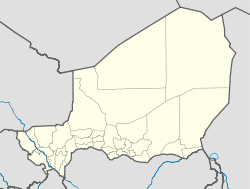Magaria is a town and urban commune in the magaria bande of the Zinder Region of Niger.[1][2]
Magaria | |
|---|---|
| Coordinates: 12°59′53″N 8°54′35″E / 12.99806°N 8.90972°E | |
| Country | |
| Region | Zinder |
| Department | Magaria |
| Area | |
| • Commune | 249.8 sq mi (647.1 km2) |
| Elevation | 1,300 ft (400 m) |
| Population (2012 census) | |
| • Commune | 130,707 |
| • Density | 520/sq mi (200/km2) |
| • Urban | 25,928 |
| Time zone | UTC+1 (WAT) |
Geography
editMagaria is located in the greater Sudan region and borders the neighbouring state of Nigeria to the south, the municipalities of Kwaya and Yékoua to the west, the municipality of Bandé to the north and the municipality of Dantchiao to the east. The municipality of Magaria consists of an urban and a rural municipal area. The urban area is divided into eleven neighbourhoods. These are called Chawa, Dan Chiffine, Gaon Kolli, Ghaga, Kitari, Maï Damoussa Haoussa, Maï Damoussa Peulh, Ménages Collectifs, Nassarawa, N'Wala and Toudoun Wada. There are 109 villages, 58 hamlets and three camps in the rural area of the municipality.[3]
Climate
edit| Climate data for Magaria (1961–1990) | |||||||||||||
|---|---|---|---|---|---|---|---|---|---|---|---|---|---|
| Month | Jan | Feb | Mar | Apr | May | Jun | Jul | Aug | Sep | Oct | Nov | Dec | Year |
| Mean maximum °C (°F) | 34.3 (93.7) |
37.8 (100.0) |
41.4 (106.5) |
43.0 (109.4) |
42.9 (109.2) |
41.6 (106.9) |
37.7 (99.9) |
36.7 (98.1) |
39.0 (102.2) |
39.4 (102.9) |
37.9 (100.2) |
35.4 (95.7) |
43.0 (109.4) |
| Mean daily maximum °C (°F) | 30.5 (86.9) |
33.8 (92.8) |
37.5 (99.5) |
40.4 (104.7) |
40.2 (104.4) |
37.5 (99.5) |
33.7 (92.7) |
32.4 (90.3) |
34.6 (94.3) |
36.9 (98.4) |
34.4 (93.9) |
31.4 (88.5) |
35.3 (95.5) |
| Daily mean °C (°F) | 21.1 (70.0) |
23.9 (75.0) |
27.9 (82.2) |
31.5 (88.7) |
32.4 (90.3) |
30.9 (87.6) |
28.3 (82.9) |
27.2 (81.0) |
28.3 (82.9) |
28.5 (83.3) |
24.8 (76.6) |
21.8 (71.2) |
27.2 (81.0) |
| Mean daily minimum °C (°F) | 11.7 (53.1) |
13.9 (57.0) |
18.3 (64.9) |
22.5 (72.5) |
24.5 (76.1) |
24.3 (75.7) |
22.8 (73.0) |
21.9 (71.4) |
22.1 (71.8) |
19.9 (67.8) |
15.2 (59.4) |
12.5 (54.5) |
19.1 (66.4) |
| Mean minimum °C (°F) | 5.6 (42.1) |
7.3 (45.1) |
10.3 (50.5) |
14.2 (57.6) |
19.7 (67.5) |
20.8 (69.4) |
19.0 (66.2) |
19.8 (67.6) |
18.9 (66.0) |
14.6 (58.3) |
8.8 (47.8) |
6.0 (42.8) |
5.6 (42.1) |
| Average precipitation mm (inches) | 0.0 (0.0) |
0.0 (0.0) |
0.3 (0.01) |
2.0 (0.08) |
22.3 (0.88) |
59.9 (2.36) |
166.6 (6.56) |
186.3 (7.33) |
73.5 (2.89) |
7.4 (0.29) |
0.0 (0.0) |
0.0 (0.0) |
507.0 (19.96) |
| Mean monthly sunshine hours | 282.1 | 260.4 | 272.8 | 267.0 | 291.4 | 273.0 | 257.3 | 238.7 | 255.0 | 288.3 | 288.0 | 282.1 | 3,248.5 |
| Mean daily sunshine hours | 9.1 | 9.3 | 8.8 | 8.9 | 9.4 | 9.1 | 8.3 | 7.7 | 8.5 | 9.3 | 9.6 | 9.1 | 8.9 |
| Source: NOAA[4] | |||||||||||||
History
editMagaria was founded by Massabaki, a prince of the Hausa state of Daura, and later fell under the rule of Zinder.[5] In the Hausa language, the place name refers to the felt-leaved jujube (Ziziphus mauritiana). In the region, its fruits are used to feed people and goats, its leaves are eaten by horses and sheep and its wood is used as firewood.[6]
In the middle of the 19th century, Magaria was developed into a fortress. The town and the surrounding villages initially came under British control at the beginning of the 20th century and were only annexed to France in 1906.[7] The French set up the first school in the village in 1918.
In the 1950s and 1960s, Magaria and the surrounding area were an important centre for the cultivation of peanuts. Shortly before Niger's independence from France in 1960, the town was a stronghold of Djibo Bakary's left-wing Sawaba party.[8]
Magaria was granted the status of an independent municipality in 1988 along with nine other Nigerien towns. Until then, there had been twelve municipalities across the country.
Economy
editThe area around the city is heavily used for agriculture due to the comparatively favourable climatic conditions for Niger.
References
edit- ^ Loi n° 2002-014 du 11 JUIN 2002 portant création des communes et fixant le nom de leurs chefs-lieux[permanent dead link]. Includes list of 213 communes rurales and seats, 52 Communes urbaines and seats
- ^ "Magaria (Commune, Niger) - Population Statistics, Charts, Map and Location". www.citypopulation.de. Retrieved 2024-02-19.
- ^ "Répertoire National des Localités (ReNaLoc)" (in French). Institut National de la Statistique, République du Niger. July 2014. pp. 624–627. Archived from the original (RAR) on 2015-09-24. Retrieved 2022-03-27.
- ^ "Station Name: MAGARIA" (TXT). National Oceanic and Atmospheric Administration. Retrieved 24 August 2024.
- ^ Rahmane Idrissa (2020), Historical Dictionary of Niger (5. ed.), Lanham/Boulder/New York/London: Rowman & Littlefield, p. 330, ISBN 978-1-5381-2014-9
- ^ Final report of the Natural Resource Planning Project for the Province of Zinder, Niger (PDF), vol. II: Appraisal of the Natural Resource and Economic Situation of the Province of Zinder, Niger, Tucson: Arid Lands Natural Resources Committee, University of Arizona, 1979, p. 63, archived from the original (PDF) on 2016-03-04, retrieved 2022-04-24
- ^ Edmond Séré de Rivières (1965), Histoire du Niger, Paris: Berger-Levrault, p. 250
- ^ Rahmane Idrissa (2020), Historical Dictionary of Niger (5. ed.), Lanham/Boulder/New York/London: Rowman & Littlefield, p. 330, ISBN 978-1-5381-2014-9
